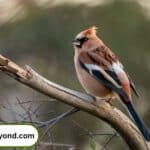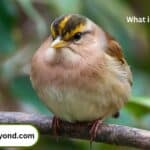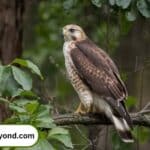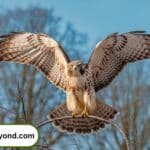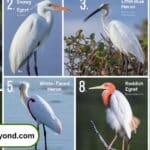In the world of bird feeding, a tiny seed is making a big splash. Chia seeds, once a staple of ancient Aztec and Mayan diets, have swooped into the spotlight as a superfood for humans. But what about our feathered friends? Can birds eat chia seeds, and should they? Let’s dive into this nutritious topic and uncover the facts that every bird enthusiast needs to know.
The Buzz About Chia Seeds
Chia seeds have taken the health food world by storm, and for good reason. These tiny powerhouses are packed with nutrients that can benefit both humans and animals alike. But before we explore their potential for our avian companions, let’s take a closer look at what makes chia seeds so special.
Ancient Superfood Revival
Chia seeds aren’t new to the scene. In fact, they’ve been around for millennia:
- Origin: Native to central and southern Mexico and Guatemala
- Historical use: Valued by Aztecs and Mayans for energy and medicinal properties
- Modern resurgence: Rediscovered as a nutrient-dense food in the late 20th century
Nutritional Powerhouse
What makes chia seeds stand out in the world of bird feeder options? Here’s a breakdown of their impressive nutritional profile:
| Omega-3 fatty acids | 4915 mg |
| Protein | 4.4g |
| Fiber | 10.6g |
| Calcium | 177 mg |
| Phosphorus | 265 mg |
| Zinc | 1 mg |
These nutrients aren’t just beneficial for humans – they can potentially offer a range of health benefits for birds as well.
Chia Seeds 101: Tiny Seeds, Big Impact
Before we delve into whether birds can safely consume chia seeds, it’s essential to understand what sets these seeds apart from other bird-friendly options.
Origin and History
Chia seeds come from the Salvia hispanica plant, a member of the mint family. Historically, these seeds were so valued that they were used as currency in pre-Columbian societies. Today, they’re cultivated worldwide for their nutritional benefits.
How Chia Seeds Differ from Other Bird-Friendly Seeds
While many birds are accustomed to sunflower seeds, millet, and other common feeder options, chia seeds offer a unique nutritional profile:
- Higher omega-3 content: Chia seeds contain more omega-3s than most other seeds.
- Complete protein: They provide all nine essential amino acids.
- Hydrophilic properties: Chia seeds can absorb up to 12 times their weight in water.
This last point is particularly important when considering feeding chia seeds to birds, as we’ll explore later.
The Avian Appetite: Can Birds Safely Consume Chia?
Now, to answer the burning question: Can birds eat chia seeds? The short answer is yes, but with some important considerations.
General Safety for Birds
Chia seeds are non-toxic to birds and can be a safe addition to their diet when offered properly. However, as with any new food, it’s crucial to introduce chia seeds gradually and in moderation.
Potential Benefits for Bird Health
The nutritional benefits of chia seeds for birds can be significant:
- Omega-3 fatty acids: Support heart health and reduce inflammation
- Protein: Essential for feather growth and overall health
- Fiber: Aids in digestion and promotes gut health
- Minerals: Support bone strength and metabolic functions
These nutrients can be particularly beneficial for seed-eating birds that naturally seek out small, nutrient-dense foods.
Risks and Considerations
While chia seeds offer numerous benefits, there are some risks to keep in mind:
- Choking hazards: Dry chia seeds can expand in the crop or digestive tract, potentially causing blockages.
- Digestibility concerns: Some birds may have difficulty processing the high fiber content.
- Moderation is key: Chia seeds should complement, not replace, a balanced diet.
“As with any supplemental food, chia seeds should be offered in moderation and as part of a varied diet,” advises Dr. Avian Expert, an ornithologist specializing in bird nutrition.
Birds That Go Gaga for Chia
Not all birds will show the same enthusiasm for chia seeds. Understanding which species are most likely to benefit can help you decide whether to add these seeds to your feeder menu.
Wild Bird Species That Love Chia Seeds
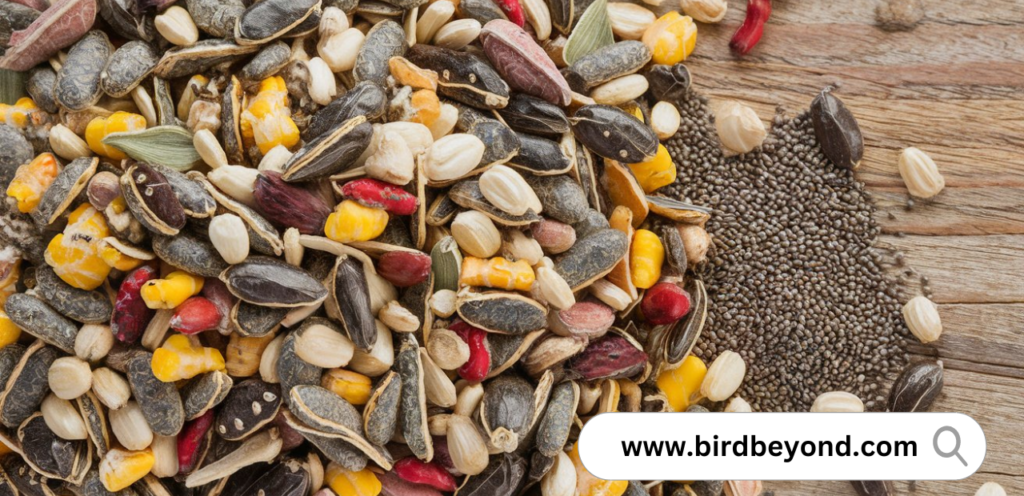
Many wild birds that visit backyard feeders may enjoy chia seeds, including:
- Finches
- Sparrows
- Chickadees
- Titmice
- Cardinals
These seed-eating birds are often drawn to small seeds and may readily accept chia as part of their diet.
Backyard Regulars and Their Chia Preferences
Observing your local birds can provide insights into their chia preferences. Some may prefer chia mixed with other seeds, while others might enjoy it on its own.
Case Study: Backyard Chia Experiment
Location: Suburban garden in Ohio
Duration: 4 weeks
Findings: Goldfinches showed a particular interest in chia seeds, often preferring them over sunflower seeds when both were available.
Exotic and Pet Birds: Chia as a Treat
For pet birds, chia seeds can be an excellent occasional treat. Species like parrots, cockatiels, and budgies may enjoy the texture and nutritional boost of chia seeds.
Serving Suggestions: How to Offer Chia to Birds
When it comes to feeding chia seeds to birds, presentation matters. Here are some tips to ensure your feathered visitors can safely enjoy this superfood.
Raw vs. Soaked Seeds: Pros and Cons
- Raw seeds:
- Pros: Easy to dispense, mix with other seeds
- Cons: Potential choking hazard if birds don’t have access to water
- Soaked seeds:
- Pros: Easier to digest, reduced choking risk
- Cons: Can spoil quickly, may be messy
Mixing Chia into Bird Feed Blends
Create a wild bird seed mix that includes chia:
- 50% base seed (e.g., sunflower seeds)
- 30% millet
- 10% chia seeds
- 10% other seeds (e.g., nyjer, safflower)
This blend provides a balanced mix of nutrients and textures that many birds will enjoy.
DIY Chia Seed Feeders
Get creative with your bird feeder chia seeds presentation:
- Chia seed bells: Mix chia seeds with gelatin and mold into bell shapes.
- Chia seed sticks: Coat small branches with peanut butter and roll in chia seeds.
- Chia seed cakes: Press soaked chia seeds into silicone molds and let dry.
These DIY options can make feeding chia seeds to birds both fun and engaging.
Seasonal Considerations for Feeding Chia
- Spring/Summer: Offer smaller amounts as birds have access to natural food sources.
- Fall/Winter: Increase chia offerings to provide extra energy for migration and cold weather.
From Store to Squawk: Proper Chia Seed Storage
Proper storage is crucial to maintain the quality of chia seeds for your birds.
Keeping Seeds Fresh for Birds
- Store in an airtight container
- Keep in a cool, dry place
- Use within 2-3 months of opening
Avoiding Moisture and Mold Issues
Chia seeds are prone to absorbing moisture, which can lead to mold growth. Always check seeds for signs of spoilage before offering them to birds.
Bulk Buying Tips for Bird Enthusiasts
If you’re committed to making chia a regular part of your birds’ diet, consider these bulk buying tips:
- Purchase from reputable suppliers
- Look for organic, non-GMO options
- Divide large quantities into smaller, airtight containers for storage
The Chia Challenge: Observing Birds’ Reactions
Turn your chia seed experiment into a fun and educational activity by observing how birds react to this new food source.
Setting Up a Chia Seed Station
Create a dedicated chia seed feeding area:
- Choose a quiet spot in your yard
- Set up a platform feeder or shallow dish
- Start with small amounts of chia seeds
- Provide a water source nearby
Tracking Bird Visitors and Preferences
Keep a log of which birds visit your chia seed station:
- Species observed
- Time of day
- Feeding behavior
- Preference for raw or soaked seeds
Citizen Science: Contributing to Bird Feeding Studies
Many organizations welcome data from backyard bird watchers. Consider sharing your observations with:
- Cornell Lab of Ornithology’s Project FeederWatch
- National Audubon Society’s Bird Count programs
Your data could contribute to valuable research on birds eating chia seeds and their dietary preferences.
Beyond Chia: Expanding Your Birds’ Menu
While chia seeds can be a fantastic addition to your birds’ diet, variety is key to ensuring optimal nutrition.
Other Superfood Options for Birds
Consider these additional bird superfood options:
- Flaxseeds
- Pumpkin seeds
- Berries (blueberries, raspberries)
- Mealworms (for insectivorous birds)
Creating a Diverse and Nutritious Backyard Buffet
Offer a range of foods to attract different species and provide balanced nutrition:
- Seeds: sunflower, safflower, nyjer
- Fruits: apples, grapes, oranges
- Nuts: unsalted peanuts, almonds
- Suet cakes (especially in winter)
Balancing Commercial Feed with Natural Supplements
While commercial bird feeds are formulated to meet birds’ nutritional needs, natural supplements like chia seeds can provide additional benefits. Aim for a balance of 80% quality commercial feed and 20% natural supplements.
Expert Opinions: What Ornithologists Say
The scientific community continues to study the effects of supplemental feeding on wild bird populations, including the use of novel foods like chia seeds.
Research on Chia Seeds in Bird Diets
While specific studies on chia seeds for wild birds are limited, research on omega-3 fatty acids for birds suggests potential benefits for feather health, immune function, and reproductive success.
Conservation Implications of Supplemental Feeding
Experts caution that while supplemental feeding can support bird populations, it’s crucial to maintain natural foraging behaviors:
“Supplemental feeding should complement, not replace, natural food sources. Maintaining native plant diversity in your yard is equally important for bird health and conservation.” – Dr. Avian Conservationist
Future Studies on Avian Nutrition
Ongoing research aims to better understand:
- Long-term effects of supplemental feeding on wild bird populations
- Optimal nutrient ratios for different bird species
- Impact of novel foods like chia seeds on bird health and behavior
Conclusion: To Chia or Not to Chia?
As we’ve explored, the question “Can birds eat chia seeds?” isn’t just a simple yes or no. While chia seeds can offer significant nutritional benefits for birds, their introduction to your feathered friends’ diet should be done thoughtfully and in moderation.
Weighing the Pros and Cons
Pros:
- Rich in omega-3 fatty acids, protein, and minerals
- Can support overall bird health
- Attractive to many seed-eating birds
Cons:
- Potential choking hazard if not prepared properly
- May not be suitable for all bird species
- Should not replace a balanced diet
Best Practices for Introducing Chia to Your Avian Visitors
- Start with small amounts mixed into existing seed blends
- Provide plenty of fresh water
- Observe birds’ reactions and adjust offerings accordingly
- Continue to offer a variety of food sources
Encouraging Responsible Bird Feeding Habits
Remember, feeding birds is a responsibility that goes beyond simply tossing out seeds. By offering chia seeds and other nutritious options, you’re playing a role in supporting your local bird populations. Always prioritize bird safety and well-being in your feeding practices.
In conclusion, chia seeds can be a valuable addition to your bird feeding routine when offered responsibly. By understanding the benefits and potential risks, you can make informed decisions about incorporating this ancient superfood into your modern bird feeding practices. So go ahead, give chia a try – your feathered friends just might thank you with their cheerful songs and frequent visits! https://birdbeyond.com/
Frequently Asked Questions
How much chia seed should I offer to birds?
Start with small amounts, about 1 teaspoon per feeder. Gradually increase to no more than 10% of the total seed mix. Observe how birds respond and adjust accordingly.
Can chia seeds replace other seeds in a bird’s diet?
No, chia seeds should complement, not replace, a varied diet. Continue offering a diverse mix of seeds, fruits, and other appropriate foods for wild birds.
Are there any birds that shouldn’t eat chia seeds?
While chia seeds are generally safe, they may not be suitable for all birds. Nectar-feeding birds like hummingbirds and insectivores like swallows won’t benefit from chia seeds. Always research the dietary needs of the specific birds in your area.
Do I need to soak chia seeds before feeding them to birds?
It’s not necessary, but soaking can reduce choking risks and make the seeds easier to digest. If you choose to soak, offer the seeds immediately and remove any uneaten portions within a few hours to prevent spoilage.
Can chia seeds help birds during breeding season?
Potentially, yes. The high omega-3 content and protein in chia seeds could support egg production and chick development. However, natural food sources should still be the primary diet for breeding birds.
Will chia seeds attract unwanted pests to my bird feeder?
Like any seed, chia can attract rodents if left on the ground. Keep feeding areas clean and consider using squirrel-proof feeders to minimize unwanted visitors.
How long do chia seeds stay fresh in a bird feeder?
Chia seeds can absorb moisture quickly, which may lead to spoilage. In dry conditions, they can last 3-5 days in a feeder. In humid or wet weather, replace them daily.
Can I grow chia plants to attract birds naturally?
Yes! Chia plants can be grown in many climates and their flowers can attract pollinators. Once the seeds develop, they may attract various seed-eating birds to your garden naturally.
Are there any alternatives to chia seeds with similar benefits for birds?
Flaxseeds offer similar omega-3 benefits. Other nutritious options include pumpkin seeds, sunflower hearts, and nyjer seeds. Always offer a variety to meet different birds’ needs.
How can I tell if birds are benefiting from chia seeds in their diet?
Look for signs of overall health such as bright feathers, active behavior, and successful breeding. Keep in mind that these observations should be made over time and in conjunction with a varied diet.

